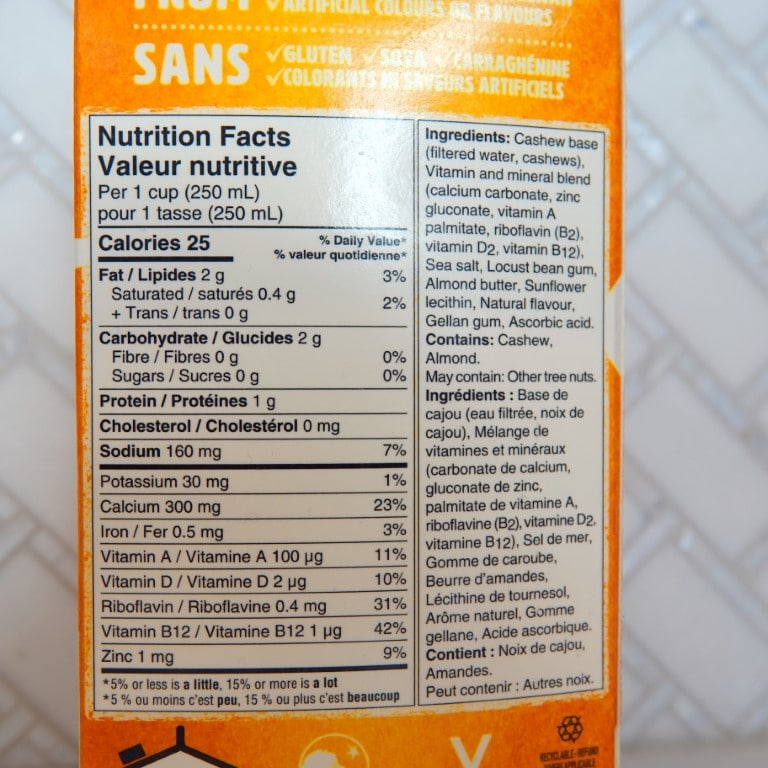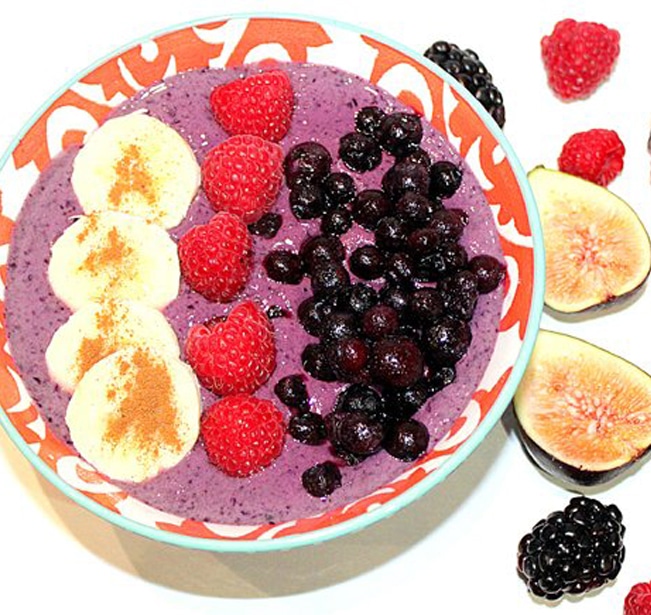Which Milk Should I Choose?
November 23, 2020
Plant-based milks such as pea milk, oat milk, almond milk, cashew milk, etc. have been growing in popularity over the past few years. I am seeing many new brands and new varieties constantly popping up on grocery store shelves. I love to read labels and see exactly what ingredients and nutrients are in the latest plant milks.
I was walking through the grocery aisle last week at a major grocery store, I picked up a new plant-based milk to read the nutrition label and noticed many nutritional inadequacies when compared to cows’ milk. The particular plant milk I was looking at was NOT fortified. I thought to myself, many people may be purchasing this milk and assuming they are getting some key nutrients that are in cow’s milk, and unknowingly be lacking certain nutrients in their diets. While plant-based milks can certainly be consumed as an alternative to cow’s milk, they don’t all have the same nutrition profile.
Not all plant-based milks are created equally.
With the sales of plant-based milk on the rise and the continued additions of plant-based alternatives on the market, I want people to be able to make an informed decision of how to make the best choice possible in terms of which milk to choose. Also, if you have switched from cow’s milk to a plant-based milk due to its increasing popularity, I want to ensure that you understand what this swap means nutritionally.
That being said, there is no specific dietary requirement to consume dairy or any milk at all. However, milk does provide a wide array of key nutrients, and replacing those nutrients requires very careful diet planning. Whether you choose cow’s milk or plant-based milk, below I am going to further explain what each choice offers nutritionally.
Cow’s milk myths
First, let’s dispel some myths about cow’s milk.
Myth: Milk is full of hormones.
Truth: Not true. In Canada. Growth hormones to stimulate milk production are NOT approved for use in Canada.
Myth: Milk is full of antibiotics.
Truth: If cows get sick and require antibiotics, the cow’s milk is disposed of for a mandatory length of time until the medication is out of her system.
In Canada, all milk is tested for antibiotic residue before the processing plant is able to accept it.
Another trending topic in relation to milk is cancer and if there is a relationship between milk causing cancer. To date, there has not been any compelling evidence to suggest that milk causes cancer.
Cow’s milk nutrition
The nutrient profile of cow’s milk has been well established as the gold standard beverage. With 9 g of good quality protein (contains all 9 essential amino acids) per 8-oz cup, this can contribute a considerable amount of protein to our daily intake.
Milk is one of the richest natural food sources of calcium (30% daily value per cup) in the human diet and in Canada, an excellent source of vitamin A (15% daily value per cup) and D (45% daily value per cup) and a host of other micronutrients (vitamin B12, riboflavin, potassium, iodine, phosphorus) that we need in our diet.
Many Canadians are not getting enough calcium, vitamin A, D, and potassium intakes. Drinking enough milk would help fill in some of those nutrient gaps that are a problem for many Canadians.
Nutrient availability of cow’s milk vs. plant-based milk
The calcium in cow’s milk is highly bioavailable. When we talk about bioavailability, we are talking about how well the calcium gets absorbed into our bodies. Most plant milks are fortified with calcium, but the bioavailability in the body is uncertain, as nutrient content on a nutrition label doesn’t guarantee absorption quantities. So, what is listed on the label is not necessarily absorbed by the body. That being said, the absorption of calcium varies from all different sources.
Both legumes and grains, the base for many plant-based milks, contain high amounts of phytic acid, a compound that binds strongly to minerals and trace elements, and that can decrease their absorption.
Reason people may want to choose plant-based milks
There are many different reasons why people may choose to consume a plant-based milk including allergies, ethical concerns, lactose intolerance, environmental considerations, taste, and more.
Plant-based milks are superior to cow’s milk when it comes to the environment as they leave a much smaller carbon footprint. Plant-based milk has less of an environmental impact on the planet than cow’s milk as cows release harmful methane gas in the environment.
What to look for when choosing a plant-based milk
When choosing a plant-based milk, it is very important to read the ingredients list along with the nutrition facts panel. Some plant-based milks are not fortified with vitamins and minerals, which would make them nutritionally inadequate when compared to cow’s milk and possibly pose some nutrient deficiencies in an individual’s diet.
The quality of plant-based milks varies significantly when it comes to nutrients. Some contain nearly the same quantity of vitamins and minerals as cow’s milk while other plant-based milks fall far short.

Key nutrients and ingredients to look for and what to avoid in your plant-based milk
Sugar
Beware of added sugars in plant-based milks. Some plant-based milks, mostly flavored versions, have up to 20g (5 tsp) of added sugars. The added sugars can certainly add up to a sizeable amount throughout the day if you are drinking several cups. Choose unsweetened versions and try to select milks with no more than 5 g (about 1 tsp) of added sugars. Unsweetened versions may have 1-2 grams of naturally occurring sugars. By reading the ingredients list, you will be able to see if sugar was added or not. Also, it is important to note that a cup of cow’s milk does have about 13 grams of sugar that is naturally occurring from lactose.
Protein
Many plant-based milks do not compare to cow’s milk in protein content. Nearly all almond, cashew, coconut, flax, rice, and other nut milks typically have 0 to 1 gram of protein per cup. So, if you made the switch from cow’s milk to plant-based milk, you may have removed an important source of protein in your diet. Some people struggle to achieve an optimal amount of protein, especially at breakfast time. At 9 g protein per cup, cow’s milk may have been contributing a fair amount of protein to your diet. Making up the protein missing from your plant-based milk is certainly achievable, but may be challenging for some people. Just keep that in mind if you decide to choose plant-based milk that is low in protein, you should try to make up the protein in other ways in your diet.
Soy milk and pea milks have comparable protein content to cow’s milk. So, if you think you are falling short of protein, you may want to opt for one of those milks instead of the other plant-based milks.
Comparing nutrients
When looking for plant-based milk, you may want to compare nutrient quantities in comparison to cow’s milk and other plant-based milks. Comparing protein, calcium, and vitamin A and D will help you choose the best plant-based milk or will help you understand what nutrient gaps you need to fill.
The chart below is a comparison of milks. The numbers are based on leading brands on the market. Please keep in mind that all brands have differences in their nutrient quantities. Some brands are NOT fortified with ANY nutrients (or enough), so they do not contain calcium, vitamin A and D, etc. Reading labels is the BEST way to compare milks.
| Calories | Protein | Fat | Calcium % Daily value | Vitamin D %Daily Value | Vitamin A %Daily value | |
| Cow’s milk (1%) | 100 cal | 9 g | 2.5 g | 30% | 45% | 15% |
| Soy milk | 110 cal | 8 g | 4g | 30% | 15% | 15% |
| Almond milk | 30 cal | 1 g | 2.5 g | 30% | 45% | 10% |
| Oat milk | 110 cal | 4g | 5g | 23% | 10% | 11% |
| Coconut milk | 60 cal | 0.5g | 5g
|
30% | 25% | 10% |
| Rice milk | 120 cal | 1g | 2.5g | 2% | 0% | 0% |
Key points to consider when choosing a milk right for you
• I cannot stress enough the importance of reading nutrition labels to understand what is in your milk. The plant source, processing, and fortification all have an impact on nutritional value.
• Consider any additives to the ingredient list of plant-based milks.
• If you are following primarily a vegan diet or consuming minimal animal products, then vitamin B12 is an important nutrient to look for in your milk.
• Cow’s milk is a good source of iodine. Plant-based milks are typically not fortified with iodine. If you are using strictly a plant-based milk, then ensure you are getting another good source of iodine in your diet. Using iodized salt in your cooking is one example of a good source of iodine (sea salt, kosher salt, and Himalayan salt are usually not iodized). This is especially a concern for vegans.
• Plant-based milk may not contain other nutrients such as riboflavin, phosphorus, zinc, magnesium, phosphorus, and potassium that naturally occur in cow’s milk even though that may not necessarily present on the nutrition label.
• Fortified soymilk is the best plant-based substitute for cow’s milk in the human diet as it is nutritionally the most similar to cow’s milk.
• Almond, walnut, cashew and other nut-based milks are good sources of polyunsaturated fats along with vitamins A and E.
• If you prefer cow’s milk, then choose a lower fat option such as skim or 1%, to reduce saturated fats.
• Shake plant-based beverages well, as some of the vitamins and minerals may settle to the bottom.
As I mentioned above, you get the key nutrients of milk or dairy from other sources in your diet. Though this may be a challenge. Just as an example, for calcium (as we all know, a key nutrient in dairy): Are you eating many cups of collard greens, or kale and calcium set tofu or canned salmon with bones every day? I can go on about calcium, but I’ll save that for another blog.
If you want to see how much calcium you are getting in your diet, you can use this nifty calcium calculator on the web: https://osteoporosis.ca/bone-health-osteoporosis/calcium-calculator/#page-1
Bottom line is that it’s important to be aware of what is in your milk. Read your labels 🙂 ! If you have switched from cow’s milk to plant-based milk, be mindful about replacing some of the nutrients that may be lacking. It certainly is possible to use solely plant-based milk (or even no milk at all) and still get all the nutrients you require. However, you may need to make other adjustments to your diet to compensate for missing nutrients. Most importantly, be sure to eat a well-balanced diet, full of leafy greens, colorful veggies, nuts, seeds, whole grains, and lean proteins to ensure you are getting all the nutrition you need.
xo Elizabeth




I am supposed to drink lactose intolerant milk 1% I like cows milk wich would be the best for me.
Dear Elizabeth,
Thank you for your wealth of information regarding the different types of milk on the market. As a result I feel that I can make an informed selection of the kind of milk that I would like to drink.